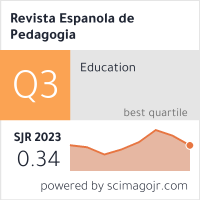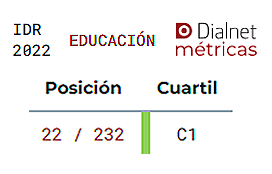Abstract
In this article we reflect, from a theoretical and critical perspective, on how public opinion is currently shaped by social networks, focusing on the case of Twitter. Going beyond a purely sociological or factual concept of public opinion, we will offer arguments for expanding its meaning while proposing a model of deliberative democracy. In order to do so, we use some well-known constructs from the field of social communication, such as the spiral of silence or digital niches, which provide a referent for interpreting the phenomenon of social networks from a critical hermeneutics. The analysis of Twitter as a platform for public opinion also aims to provide the keys to building an educational outlook, understanding that one of the purposes of this area in a democracy is to educate citizens about digitally formed currents of opinion, especially those supporting populist political movements and aggravated by the spread of fake news. After delving into the socio-political dimension of social networks such as Twitter, we conclude by proposing a normative concept of interactive public opinion, a proposal that will be specified in a set of educational competences at the epistemological and civic ethical level relating to the democratic use of social media.
This is the English version of an article originally printed in Spanish in issue 274 of the revista española de pedagogía. For this reason, the abbreviation EV has been added to the page numbers. Please, cite this article as follows: Gozálvez, V., Romero-Rodríguez, L. M., & Larrea-Oña, C. (2019). Twitter y opinión pública. Una perspectiva crítica para un horizonte educativo | Twitter and public opinion. A critical view for an educational outlook. Revista Española de Pedagogía, 77 (274), 403-419. doi: 10.22550/REP77-3-2019-04
Referencias | References
Allport, F. (1937). Toward a science of public opinion. Public Opinion Quarterly, 1 (1), 7-23.
Anstead, N., & O’Loughlin, B. (2015). Social media analysis and Public Opinion: The 2010 UK General Election. Journal of Computer-Mediated Communication, 20, 204-220.
Arteta, M. (2016). La hermenéutica crítica de Habermas: Una profundización de la hermenéutica gadameriana. Contrastes. Revista Internacional de Filosofía, 21 (2), 27-39.
Baek, Y. M. (2015). Political Mobilization through Social Networks Sites: The Mobilizing Power of Political Messages Received from SNS friends. Computer in Human Behavior, 44, 12-15.
Bakir, V., & McStay, A. (2017). Fake News and the Economy of Emotions. Digital Journalism, 6 (2), 154-175.
Baron, J. (1998). Thinking and Deciding. New York: Cambridge University Press.
Barberá, P., Jost, J. T., Nagler, J., Tucker, J. A., & Bonneau, R. (2015). Tweeting from left to right: Is online political communication more than an echo chamber? Psychological Science, 26 (10), 1531-1542.
Basave, A. (2013). Del 11-MM al #YoSoy132: crónica de un movimiento denunciado. In J. Buj (Ed.), Universidad desbordada: jóvenes, educación superior y política. México D.F.: Universidad Iberoamericana.
Bauman, Z. (2006). Vida líquida. Barcelona: Paidós.
Bauman, Z., & Donskis, L. (2015). Ceguera moral: la pérdida de sensibilidad en la modernidad líquida. Barcelona: Paidós.
Buckingham, D. (2014). Media education. Literacy, learning and contemporary culture. Polity press: Cambridge.
Camps, V. (2004). Opinión pública, libertad de expresión y derecho a la información. In J. Conill & V. Gozálvez (Eds.), Ética de los medios. Una apuesta por la ciudadanía audiovisual (pp. 33-50). Barcelona: Gedisa.
Capellán, G. (2008). Opinión pública: Historia y presente. Madrid: Trotta.
Castells, M. (2003). La galaxia Internet. Barcelona: Debolsillo.
Castells, M. (2008). The New Public Sphere: Global Civil Society, Communication Networks, and Global Governance. The Annals of the American Academy of Political and Social Science, 616 (1), 78-93.
Castells, M. (2009). Comunicación y poder. Madrid: Alianza.
Childs, H. L. (1965). Public Opinion. Nature, Formation and Role. Princeton: Van Nostrand.
Conill, J. (2006). Ética hermenéutica. Crítica desde la facticidad. Madrid: Tecnos.
Conill, J. (2008). Hermenéutica crítica desde la facticidad de la experiencia. Convivium, 21, 31-40.
Conill, J. (2010). La alteridad recíproca y la experiencia del reconocimiento. Investigaciones fenomenológicas, 2, 61-76.
Conover, M., Ratkiewicz, J., Francisco, M. R., Gonçalves, B., Menczer, F., & Flammini, A. (2011). Political polarization on twitter. ICWSM, 133, 89-96.
Cortina, A. (1985). La ética discursiva. In V. Camps (Ed.), Historia de la Ética (pp. 532-576). Barcelona: Crítica.
Cortina, A. (2008). Ética aplicada y democracia radical. Madrid: Tecnos.
Cortina, A. (2016). El triunfo de populistas como Trump se debe al auge de emociones. Retrieve from https://www.eldiario.es/cultura/populistas-Trump-emociones-Adela-Cortina_0_579892342.html (Consulted on 2016-11-13).
Dahlgreen, P. (2005). The Internet, public spheres and politican communication. Dispersion and Deliberation. Political Communication, 22 (2), 147-162.
Dewey, J. (1927/2004). La opinión pública y sus problemas. Madrid: Morata.
Elster, J. (Ed.) (2001). La democracia deliberativa. Bardelona: Gedisa.
Ferrés, J., & Piscitelli, A. (2012). La competencia mediática: propuesta articulada de dimensiones e indicadores. Comunicar, 19, 75-82.
Fishkin, J. S., & Luskin, R. C. (2005). Experimenting with a democratic ideal: deliberative polling and public opinion. Acta Politica, 40 (3), 284-298.
Gallup, G. H. (1939). Public opinion in a democracy. Princeton: Princeton University Press.
Gozálvez, V., & Aguaded, I. (2012). Educación para la autonomía en sociedades mediáticas. Anàlisi, 45, 1-14.
Gozálvez, V. (2013). Ciudadanía mediática. Una mirada educativa. Madrid: Dykinson.
Gozálvez, V., & Contreras-Pulido, P. (2014). Empoderar a la ciudadanía mediática desde la educomunicación. Comunicar, 42, 129-136.
Gracia, J., & Gozálvez, V. (2016). Justificación filosófica de la educación en valores éticos y cívicos en la educación formal. Análisis crítico de la LOMCE. Teoría de la Educación, 28 (1), 83-103.
Greppi, A. (2012). La democracia y su contrario. Representación, separación de poderes y opinión pública. Madrid: Trotta.
Gruzd, A., & Roy, J. (2014). Investigating political polarization on Twitter: A Canadian perspective. Policy & Internet, 6 (1), 28-45.
Habermas, J. (1994). Historia y crítica de la opinión pública. La transformación estructural de la vida pública. Barcelona: Gustavo Gili.
Habermas, J. (2002). Conciencia moral y acción comunicativa. Barcelona: Península.
Habermas, J. (2010). Teoría de la acción comunicativa. Madrid: Trotta.
Hindman, M. (2008). The Myth of Digital Democracy. New Jersey: Princeton University Press.
Hong, S., & Kim, S. H. (2016). Political polarization on Twitter: Implications for the use of social media in digital governments. Government Information Quarterly, 33 (4), 777-782.
Ibarra, P., Martí, S., & Gomà, R. (Eds.) (2002). Creadores de democracia radical. Movimientos sociales y redes de políticas públicas. Barcelona: Icaria.
Innerarity, D. (2006). El nuevo espacio público. Madrid: Espasa.
Jagers, J., & Walgrave, S. (2007). Populism as politics communication style. European Journal of Political Research, 46 (3), 319-345.
Jover, G., Fernández-Salinero, C., & Ruiz-Corbella, M. (2005). El diseño de titulaciones y programas ante la convergencia europea. In V. Esteban Chapapría (Ed.), El espacio europeo de educación superior (pp. 27-93). Valencia: Editorial de la Universidad Politécnica de Valencia.
Kahne, J., Lee, N. J., & Feezell, J. T. (2012). Digital Media Literacy Education and Online Civic and Political Participation. International Journal of Communication, 6, 1-24.
Kahneman, D. (2011). Thinking, Fast and Slow. New York: Farrar, Straus and Giroux.
Katz, E. (1957). The Two-Step Flow of Communication: An Up-To-Date Report on an Hypothesis. Political Opinion Quarterly, 21 (1), 61-78.
Katz, E., & Lazarsfeld, P. F. (1966). Personal Influence, the Part Played by People in the Flow of Mass Communications. London: Transaction Publishers.
Kohlberg, L., Power, F. C., & Higgins, A. (2009). La educación moral según L. Kohlberg. Barcelona: Gedisa.
Lazer, D. M. J., Baum, M. A., Benkler, Y., Berinsky, A. J., Greenhill, K. M., Menczer, F, … Zittrain, J. L. (2018). The science of fake news. Science, 359 (6380), 1094-1096.
Lee, C., Shin, J., & Hong, A. (2017). Does Social Media Use Really Make People Politically Polarized? Direct and Indirect Effects of Social Media Use on Political Polarization in South Korea. Telematics and Informatics, 35 (1), 245-254.
Levinas, E. (2014). Alteridad y trascendencia. Madrid: Arena Libros.
Lippmann, W. (2003). La opinión pública. Madrid: Cuadernos de Langre. Luhmann, N. (2000). La realidad de los medios de masas. Barcelona: Anthropos.
MacPherson, C. B. (2003). La democracia liberal y su época. Madrid: Alianza.
Masterman, L. (1985). Teaching the Media. London: Comedia Publishing.
Mead, G. H. (2009). Escritos políticos y filosóficos. Buenos Aires: FCE.
Mellon, J., & Prosser, C. (2017). Twitter and Facebook are not representative of the general population: Political attitudes and demographics of British social media users. Research & Politics, 4 (3), 1-9.
Mill, J. S. (1859). On liberty. London: John W. Parker & Son.
Miyata, K., Yamamoto, H., & Ogawa, Y. (2015). What affects the spiral of silence and de hard core on Twitter? An analysis of the nuclear power issue in Japan. American Behavioral Scientist, 59 (9), 1129-1141.
Monzón, C. (2006). Opinión pública, comunicación y política. Madrid: Tecnos.
Morozov, E. (2011). The net delusion: The dark side of Internet freedom. New York: Public Affairs. Noddings, N. (2002). Educating Moral People. New York: Teachers College Press.
Noelle-Neumann, E. (1984): La espiral del silencio. Opinión pública: nuestra piel social. Barcelona: Paidós.
Nussbaum, M. (2012). Crear capacidades. Propuesta para el desarrollo humano. Barcelona: Paidós.
Parenti, M. (2001). Monopoly Media Manipulation. Retrieved from https://bit.ly/2x9fusy (Consulted on 2018-02-12).
Pérez-Tornero, J. M., & Varis, T. (2012). Alfabetización mediática y nuevo humanismo. Barcelona: UOC-UNESCO.
Pettit, Ph. (1999). Republicanismo. Una teoría sobre la libertad y el gobierno. Barcelona: Paidós. Price, V. (1994). La opinión pública. Esfera pública comunicación. Barcelona: Paidós.
Price, V., Nir, L., & Capella, J. N. (2006). Normative and informational influences in online political discussions. Communication Theory, 16 (1), 47-74.
Sampedro, V. (2000). Opinión pública y democracia deliberativa. Madrid: Istmo. Santos, E. (2016). Las cifras de Twitter en su décimo aniversario. Retrieved from https://www.huffingtonpost.es/2016/03/21/cifras-twitter_n_9496074.html (Consulted on 2018-02-24).
Saura, G., Muñoz-Moreno, J. L., Luengo-Navas, J., & Martos, J. M. (2017). Protestando en Twitter: ciudadanía y empoderamiento desde la educación pública. Comunicar, 25 (53), 39-48.
Sundar, S. S. (2008). The MAIN Model: A Heuristic Approach to Understanding Technology Effects on Credibility. In M. J. Metzger & A. J. Flanagin (Eds.), Digital Media, Youth, and Credibility, 73-100. Cambridge: The MIT Press.
Sunstein, C. R. (2009). Republic.com 2.0. Revenge of the Blogs. Princeton: Princeton University Press.
Tandoc, E. C., Wey Lim, Z., & Ling, R. (2017). Defining “Fake News”. Digital Journalism, 6 (2), 137-153.
Thorson, E. (2008). Changing Patterns of News Consumption and Participation. Information, Communication and Society, 11 (4), 473-489.
Tocqueville (de), A. (2018). La democracia en América. Madrid: Trotta.
Torrego-González, A., & Gutiérrez-Martín, A. (2016). Ver y tuiterar. Reacciones de los jóvenes ante la representación mediática de la resistencia. Comunicar, 24 (47), 9-17.
Tur, G., Marín, V. I., & Carpenter, J. (2017). Uso de Twitter en Educación Superior en España y Estados Unidos. Comunicar, 25 (51), 19-28.
UNESCO (2015). Rethinking education. Towards a global common good? Retrieve from https://unesdoc.unesco.org/ark:/48223/pf0000232555 (Consulted on 2018-05-20).
Vázquez-Cano, E., López Meneses, E., & Sevillano García, M. L. (2017). La repercusión del movimiento MOOC en las redes sociales. Un estudio computacional y estadístico en Twitter | The impact of the MOOC movement on social networks. A computational and statistical study on Twitter. revista española de pedagogía, 75 (266), 47-64. doi: https://doi.org/10.22550/REP75-1-2017-03
Vosoughi, S., Roy, D., & Aral, S. (2018). The spread of true and false news online. Science, 359 (6380), 1446-1151.
Whitman Cobb, W. N. (2015). Trending now. Using big data to examine public opinion of space policy. Space Policy, 32, 11-16.
Woong Yun, G., & Park, S. (2011). Selective posting: Willingness to post a message online. Journal of Computer-Mediated Communication, 16, 201-227.
Citación recomendada | Recommended citation
Gozálvez, V.,
Romero-Rodríguez, L. M.,
&
Larrea-Oña, C.
(2019)
.
Twitter and public opinion. A critical view for an educational outlook.
Revista Española de Pedagogía, 77(274).
https://www.revistadepedagogia.org/rep/vol77/iss274/11
Licencia Creative Commons | Creative Commons License
Esta obra está bajo una licencia internacional Creative Commons Atribución-NoComercial 4.0.
This work is licensed under a Creative Commons Attribution-NonCommercial 4.0 International License

- Citations
- Citation Indexes: 17
- Usage
- Abstract Views: 538
- Downloads: 400
- Captures
- Readers: 71
- Mentions
- News Mentions: 1
Palabras clave | Keywords
socialmedia








